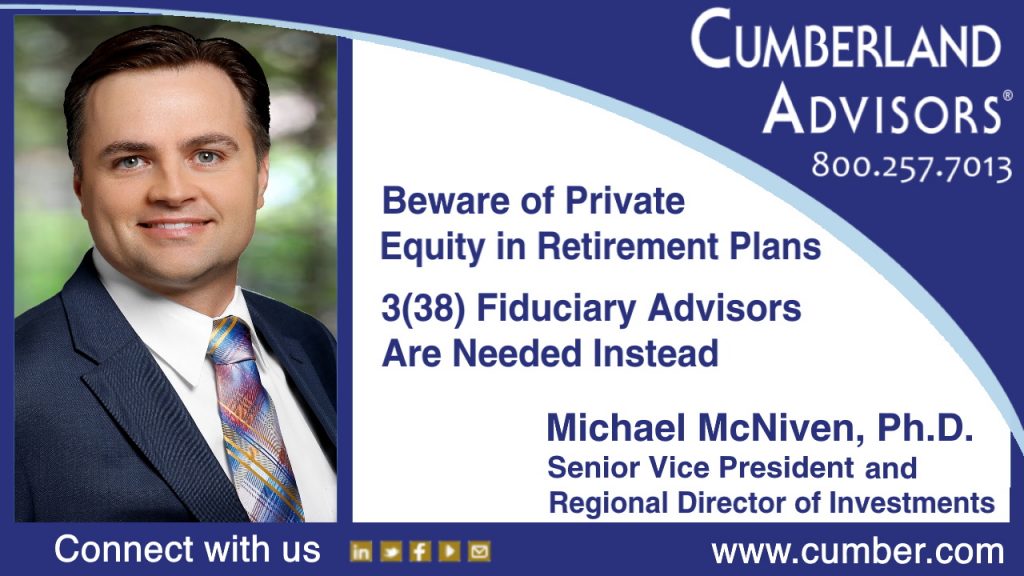Over the summer, the private equity industry received a very favorable ruling from the Department of Labor, allowing 401(k) plans to invest in private equity funds. Of course, the private equity industry and their lobbyists have long desired the opportunity to access 401(k) assets, and they are ecstatic. This opportunity opens up several trillion dollars in potential assets to private equity funds, their opaque structure and high fees notwithstanding. But the inclusion of private equity in retirement plans is not a positive development, and it will not ultimately be good for working people’s retirement savings.
It is no surprise that this deregulation has occurred with Labor Secretary Eugene Scalia at the helm of the Department of Labor. Mr. Scalia, a son of the late Justice Antonin Scalia, has developed a reputation for representing corporations and the financial industry at the expense of consumers. For a 401(k) industry that has been plagued with bad practices and unnecessarily high fees over the last forty years, having Mr. Scalia at the helm amounts to the fox minding the henhouse. It was Scalia himself who took the lead in defeating the Department of Labor’s fiduciary rule in 2018. The fiduciary rule was correctly aimed at improving the investment performance of retirement plans by eliminating conflicts of interest by financial advisors.
The 401(k) was originally a 1978 loophole in the law that permitted companies to allow employees to defer compensation pre-tax in order to buy stocks. That exemption then led to setting up retirement plans that became the primary retirement vehicle for American workers, in place of pensions. But the ensuing forty years has demonstrated the failure of this change in helping people adequately prepare for retirement. There are two reasons for the failure.
First, people have not saved enough money. Individuals must take ownership of their own retirement plans, yet employers and the financial industry have not done a good job in educating people about their longer-term retirement needs.
Second, the financial industry has larded up the aggregate fees in an opaque system that has systematically hindered investment returns for workers. Financial advisors who recommend high-fee mutual funds or other investments receive backdoor payments known as “revenue sharing.” Further deregulation to allow more opacity and higher-expense private equity investments only exacerbates the problem.
Secretary Scalia claims that this change will “help Americans saving for retirement gain access to alternative investments that often provide strong returns.” How often there will be “strong returns” is the real question. Optimal returns are not likely to occur, given the history of 401(k) industry practices. Much like high-fee mutual funds that erode investment performance over time, high-fee private equity investments in retirement plans will not likely improve the aggregate returns for investors. This ruling is only another way for the financial industry to increase its fees on trillions of dollars of basically passive investments, thereby eroding aggregate returns in retirement accounts.
3(38) Fiduciary Advisors
In fact, what the retirement industry really needs is more fiduciary advisors who can help companies leave behind the bundled, opaque, and expensive plans that are currently being offered for more promising, more transparent options. If Labor Secretary Scalia were to side with the people rather than the financial industry, he might actually be pushing ahead with a greater fiduciary rule requiring all financial advisors to retirement plans to be 3(38) fiduciaries. That would eliminate all forms of revenue sharing (i.e. backdoor payments) and at least start the process of getting retirement plans structured for the maximum benefit of workers by eliminating high fees and conflicts of interest. Embedding opaque investment vehicles like private equity funds in retirement accounts merely guarantees greater sustained profits for the financial industry while eroding overall returns for 401(k) savers and investors.
Disclosure
We are a 3(38) fiduciary, and we do advise on retirement plans. When possible, we partner with Newport Group for record-keeping and third-party administration services. They have helped pioneer the model of transparent, unbundled, low-cost but quality retirement plans that are offered across the country. Retirement plans can be complicated, and most business owners would rather sit for a root canal at their dentist than dig into the details of their retirement plans. But a fiduciary investment advisor can help in important ways to get appropriate investments and structure in place and, most importantly, to get aggregate fees down to a very competitive level.
Cumberland Advisors will definitely not be recommending private equity for 401(k)s and retirement plans.
Michael McNiven, Ph.D.
Senior Vice President & Regional Director of Investments
Email | Bio
Links to other websites or electronic media controlled or offered by Third-Parties (non-affiliates of Cumberland Advisors) are provided only as a reference and courtesy to our users. Cumberland Advisors has no control over such websites, does not recommend or endorse any opinions, ideas, products, information, or content of such sites, and makes no warranties as to the accuracy, completeness, reliability or suitability of their content. Cumberland Advisors hereby disclaims liability for any information, materials, products or services posted or offered at any of the Third-Party websites. The Third-Party may have a privacy and/or security policy different from that of Cumberland Advisors. Therefore, please refer to the specific privacy and security policies of the Third-Party when accessing their websites.
Sign up for our FREE Cumberland Market Commentaries
Cumberland Advisors Market Commentaries offer insights and analysis on upcoming, important economic issues that potentially impact global financial markets. Our team shares their thinking on global economic developments, market news and other factors that often influence investment opportunities and strategies.


